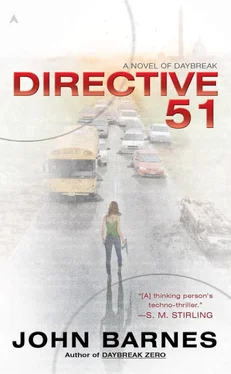“Sometimes the math finds a complex system like Islam, ‘Go Angels!’, or model railroading, where there are central ideas that change little and repeat often, but generate a huge volume of secondary short-lived messages—like Catholicism, say, the pope says pretty much what every pope always said, but your Catholic mother says, ‘What would Father McCarthy say if he found out you did that?’, that’s a secondary message reproducing and altering part of the primary message.”
“You were going to explain system artifact, Arnie,” Heather prompted.
Edwards cleared his throat. “I think I see where this is going from what Arnie’s already said. So a system artifact is a pattern that carries a message and originates in the system, not from any one participant, but from everyone at once.”
“Exactly,” Arnie said.
“Like esprit de corps, or corporate culture?” Green said. “No one makes them up, and you can’t order people to have them, they just sort of grow between people, but anyone who’s been around them knows they’re real.”
Steve looked up, and said, “That’s what you think Daybreak is. A group of ideas that… what, fused? Found a way to… ?”
“Evolved,” Arnie said. “It started out as a huge, inchoate list of reasons people didn’t like the modern world. As the people talked to each other, Daybreak lost all the reasons and justifications over time—I can trace out about the last half of that process—and converged on a basic idea: Working together, we can take down civilization, and we should. Within a few years, because Daybreak had acquired the priority of finding ways to propagate and to move out of virtual and into real events, it acquired skilled people, and got better at persuading them to join, and at giving up the aspects of their own ideas that separated them from other possible Daybreakers, and so on.”
“How does it keep them in line?” Heather asked. Good, good, mostly they’re getting it, look at them nod. This is going better than I thought it would. Come on, Arnie, make it—
“Well, that’s something it copied from a lot of the New Thought and ‘spiritual’ parts of the web,” Arnie said. “Made more extreme, of course. Most serious Daybreakers spend two to four hours a day staring into the computer screen while they play Daybreak messages that tell them to relax and feel calm and happy—and think about what they can do to take down the Big System. The messages reinforce negative associations for the Big System, so that the person automatically blames every small thing that goes wrong on plastic and electronics and corporations. They tie self-esteem to being Daybreak-oriented. And listening to the messages makes Daybreakers calm and happy.
“Then too, it spreads and infects other systems of ideas. About eighteen months ago Daybreak penetrated the coustajam movement in music, and that helped prepare a lot more people to drift into Daybreak; it’s also invaded the Stewardship Christianity branch of fundamentalism, and the Japanese Middle Earth Liberation League, and the Sons of Boone and Applegate, and lots of other places. But no matter what door people come into Daybreak from, once they become self-aware that they’re attracted to Daybreak, Daybreak will teach them to spend a lot of time repeating Daybreak messages to themselves, or playing them over and over from recorded media, in a deep suggestible state.”
“Who writes the messages?”
“Lots of Daybreakers scattered all over. Then they send them to each other, and try them out to see how they work with prior Daybreak messages. And they all collectively select the ones to use in their meditation and the ones to discard. For people who have been in Daybreak for three years or so, Daybreak is as central as Jesus is for a serious Baptist or the Revolution is for a serious Communist, but much more systematic and internally consistent—optimized really. Daybreak doesn’t need an enforcement system—no Inquisition, no thought police, no awareness of a friend who deviated and was shunned or arrested, because Daybreak is always a welcoming path that leads you deeper and deeper and makes you feel better at every step.
“So I think what we are seeing is the evolution of a new, much more powerful and effective kind of system artifact, and we have to understand it as such if we’re going to—”
Cameron sighed, impatiently. “All that was interesting theory until you found the connection to il’Alb il-Jihado,” he said. “But now as I see it you’ve got two possibilities. Wherever Daybreak might have come from and however people might practice it, it comes down to this: Either Daybreak found an enemy of the United States and allied with it, or the enemy found Daybreak and duped it. That means Daybreak has a leadership somewhere—leaders to be fooled or leaders to make the decision to be an ally—”
Shouting in the main room outside.
They all froze.
Cam muttered “Excuse me,” and went through the door; by common consent, as they looked around, everyone seemed to agree to go see what the matter was. Funny, Heather thought, none of us individually decided to drop Arnie’s explanation and go out the door, but here we are, filing out. Have to ask him if that would be a system artifact.
“I just think I should go with Kim!” President Roger Pendano’s voice was wild, yelping, cracking with misery.
DoDDUSP Garren and half a dozen uniforms were all crowding around him, saying “Mr. President” in an urgent tone that meant Listen!
Cam headed for the little group by the door, trying to be there instantly while not looking like he was hurrying. Now Pendano’s voice was too low to hear words, but the passionate, desperate, throat-mashing whine in the tone was painfully audible.
Lenny said, softly, “The president wants his dinner and his bed; look at the shoulders and the expression. Shit, shit, shit. Maybe if Garren or Nguyen-Peters pulled a Patton on him, right now, and just slapped him?”
Heather shook her head. “I don’t think the Secret Service would let Garren do that, and Cam’s too gentle and has too much respect. Besides, it might just send Pendano right over the edge.”
“He wasn’t this way about the Federal Reserve bombing, or the attack on the Franklin Roosevelt. ”
Heather sighed and shrugged. “But those were ‘routine terrorism’—nothing personal—it wasn’t the enemy torturing one of his best friends, then blowing him to bits, let alone something he has to blame himself for.”
Kim Samuelson departed like a lost little girl between three big Secret Service agents; Pendano slumped into a chair, face in his hands, with Garren squatting beside him and whispering, urgently.
“Breaks your heart, doesn’t it?” Lenny said.
“Yeah.” A thought struck Heather. “Might be something I can do. Back in a second.” She walked directly over to Cameron, who held his hands up as if to fend off two generals and a Secret Service man. “Cameron, I have something urgent and relevant.” She purposely stopped about twenty feet from him.
He held up an index finger to the group and walked over to her, whispering, “Thanks for the rescue, and what do you have?”
“Graham Weisbrod is good with former students in trouble. He’s stuck me back together many times. Maybe if he can talk to the President—”
Cameron grunted as if he were deflating. “Anything that has the slightest chance of working, sure. Call Weisbrod. And thanks.”
Heather turned around and nearly collided with Allie. Startled, she didn’t speak until Allie said, “Sorry, I overheard. I was coming over to suggest the same thing.”
Cameron smiled faintly. “Apparently Graham Weisbrod has some kind of amazing calming power on the minds of his former students. I don’t mind telling you, if he can do that for you at a time like this, I wish he’d been my teacher too. Anyway, go get the guru and see if he can do anything for the president. If you’ve got a witch doctor on tap someplace, bring that one along too.”
Читать дальше












